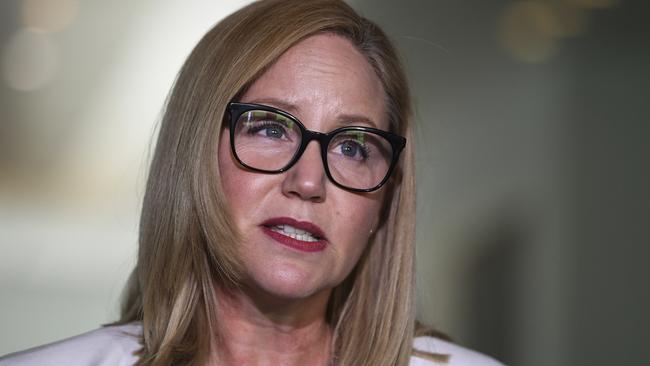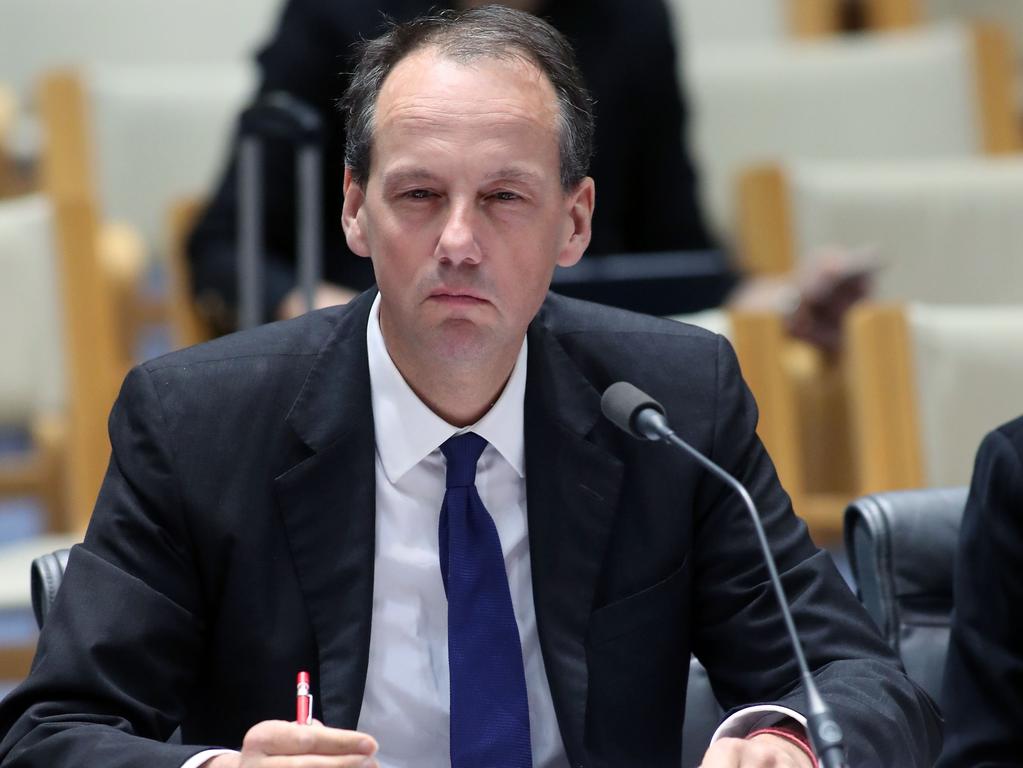Westpac sued by Austrac over anti-money laundering rules, child exploitation risks
Brian Hartzer shrugs off suggestions he should quit over allegations bank failed to properly monitor and report transactions with a known child exploitation risk.
Westpac chief executive Brian Hartzer has shrugged off suggestions he should resign after Australia’s anti money-laundering and counter-terrorism financing regulator took legal action against the bank, even as he said he’s “disgusted and appalled” by the allegations.
Austrac has taken Westpac to court, alleging the bank contravened anti-money laundering and terrorism rules on over 23 million occasions and failed to properly monitor and report transactions with a known child exploitation risk.
Speaking to the media on Wednesday afternoon, Mr Hartzer said he would personally spearhead the bank’s response to the action.
“Like everyone who has read the statement of claim I am personally disgusted and appalled by the subject matter of some of these transactions,” he said. I deeply regret that this has occurred and as I said, I will get to the bottom of this personally and fix it.”
Australia’s anti money-laundering and counter-terrorism financing regulator, Austrac has taken Westpac to court, alleging the bank contravened anti-money laundering and terrorism rules on over 23 million occasions and failed to properly monitor and report transactions with a known child exploitation risk.
Austrac’s civil proceedings, launched in the Federal Court took aim at Westpac executives for their “indifference”. Austrac also claimed the bank failed to pass on information about the source of funds to other banks.
READ MORE: Gluyas — Allegations aimed at the top | PM ‘appalled’ by allegations | Durie — Belated reckoning for banks
“This conduct deprived the other banks of information they needed to understand the source of funds to manage their own AML/CTF (anti-money laundering/counter terrorism financing) risks,” Austrac said.
Child exploitation risks
Austrac’s statement of claim is damning for Westpac chief Mr Hartzer and his executive team, claiming they were briefed in mid 2016 on the risks linked to payments that could have involved child exploitation.
“Since at least 2013, Westpac was aware of the heightened child exploitation risks associated with frequent low value payments to the Philippines and South East Asia, both from Austrac guidance and its own risk assessments. In June 2016, senior management within Westpac was specifically briefed on these risks with respect to the LitePay channel,” the statement of claim said.
The statement of claim also alleges Westpac has still not implemented automated systems to monitor for child exploitation risks.
“It was not until June 2018 that Westpac implemented an appropriate automated detection scenario to monitor for known child exploitation risks through its LitePay platform. Westpac still has not implemented appropriate automated detection scenarios to monitor for the known child exploitation risks through other channels,” it said.
“ As a result, Westpac has failed to detect activity on its customers’ accounts that is indicative of child exploitation.”
Austrac said the contraventions were the result of “systemic failures” in Westpac’s control environment, “indifference by senior management and inadequate oversight by the board”.
Morrison ‘appalled’
Scott Morrison says he is “absolutely appalled” by the allegations, declaring the “banks need to lift their game”.
The Prime Minister said the allegations against Westpac, which includes failing to monitor and report transactions that had child exploitation risks, showed more change was needed in the financial services industry.
Banks need to keep lifting their game but it also shows that our cop on the beat, Austrac, is doing their job,” Mr Morrison said on Wednesday morning.
“They have just got to lift their game on this stuff. It is a fairly damning indictment about some of the processes and procedures they have had in place.”
Known offender
The statement of claim noted: “One customer opened a number of Westpac accounts after serving a custodial sentence for child exploitation offence”.
“Westpac promptly identified activity on one account that was indicative of child exploitation, but failed to promptly review activity on other accounts. This customer continued to send frequent low value payments to the Philippines through channels that were not being monitored appropriately,” the Austrac statement of claim said.
The document lodged with the court alleges Westpac failed to conduct proper diligence on 12 customers linked to child exploitation risks.
“Westpac has failed to carry out appropriate due diligence on 12 of its customers, with a view to identifying, mitigating and managing known child exploitation risks. Over a number of years, there were repeated patterns of frequent low value transactions on accounts held by each of these 12 customers that were indicative of child exploitation risks,” it said. “Since at least 2013, Westpac was aware of the heightened child exploitation risks associated with these patterns of transactions.”
Prime Minister Scott Morrison said he was appalled by allegations. “Banks need to keep lifting their game but it also shows that our cop on the beat, Austrac, is doing their job,” Mr Morrison said on Wednesday morning.
“They have just got to lift their game on this stuff. It is a fairly damning indictment about some of the processes and procedures they have had in place.”
Shares hit
Following the news, the bank’s shares were 2.3 per cent lower at $25.95 after 15 minutes of trade on the ASX, hitting a fresh six-month low of $25.90 along the way. By late-afternoon Westpac shares had fallen further, down 3.3 per cent to $25.67.

Acknowledging the Austrac action, Westpac said it had “previously publicly disclosed that it had self-reported to Austrac a failure to report a large number of international funds transfer instructions (IFTIs) and that Austrac was also investigating a number of other areas relating to Westpac’s processes, procedures and oversight.
Westpac CEO Brian Hartzer said the bank was working with Austrac and other law enforcement agencies. “These issues should never have occurred and should have been identified and rectified sooner. It is disappointing that we have not met our own standards as well as regulatory expectations and requirements,” he said.
“Like many banks around the world, we have been heavily investing in a program of work to improve and bolster the management of financial crime risks including strengthening our policies, data feeding systems, processes and controls.”
Last month Westpac warned of a “significant financial penalty” for anti-money laundering breaches as it warned of a wider $341 million hit to second-half cash earnings.
Austrac chief executive officer Nicole Rose said the agency’s decision to commence civil penalty proceedings was made following a detailed investigation.
READ MORE: CommInsure guilty over phone hawking | Remediation bill $10bn and counting
High risk and sanctioned countries
Among its claims, Austrac alleges Westpac failed to appropriately assess and monitor the ongoing money laundering and terrorism financing risks associated with more than $11 billion moved into and out of Australia through its correspondent banking relationships.
Westpac also allowed correspondent banks to access its banking environment and the Australian Payments System without conducting appropriate due diligence on those correspondent banks, and without appropriate risk assessments and controls on the products, Austrac claimed.
In the scathing statement of claim, Austrac said Westpac did not do enough to stop high risk countries and jurisdictions from potentially accessing the Australian payment system.
The statement said Westpac did not consider and assess the adequacy of controls over higher money laundering and terror finance risk risks, payable through accounts and dealings with “higher risk and sanctioned jurisdictions”.
“This is in spite of a number of correspondent banks disclosing higher ML/TF risks, such as themselves having correspondent banking relationships with high risk or sanctioned countries including Iraq, Lebanon, Ukraine, Zimbabwe, and Democratic Republic of Congo,” the court statement said.
“The risk posed to Westpac was that these high risk or sanctioned countries may have been able to access the Australian payment system through these nested arrangements, unbeknownst to Westpac.”
It said Westpac had failed to report more than 19.5 million international funds transfer instructions (IFTIs) to the regulator over nearly five years for transfers both into and out of Australia.
The late incoming IFTIs received from four correspondent banks that Westpac dealt with represent over 72 per cent of all incoming foreign transactions received by Westpac between November 2013 to September 2018 and amounts to over $11 billion, Austrac said.
“Senior management failed to prioritise resolution of IFTI reporting issues and were aware of longstanding noncompliance,” the statement of claim said.
“The IT system used by Westpac for IFTI reporting was not fit for purpose. Westpac had inadequate end-to-end understanding, documentation and monitoring over IFTI reporting.”
Criminal risk
Austrac CEO said the financial system had been put at risk of exploitation by criminals.
“These AML/CTF laws are in place to protect Australia’s financial system, businesses and the community from criminal exploitation. Serious and systemic noncompliance leaves our financial system open to being exploited by criminals,” Austrac Ms Rose said on Wednesday.
“The failure to pass on information about IFTIs to Austrac undermines the integrity of Australia’s financial system and hinders Austrac’s ability to track down the origins of financial transactions, when required to support police investigations.”
“We have been, and will continue to work with Westpac during these proceedings to strengthen their AML/CTF processes and frameworks,” Ms Rose said.
She noted that Westpac disclosed issues with its IFTI reporting, has co-operated with Austrac’s investigation and has commenced the process of improving its controls.
Westpac said in a statement it was reviewing Austrac’s statement of claim and would issue a further comment once it has been assessed.
Westpac noted it has previously disclosed - including in its recent full year profit results – that it had self-reported a failure to report a large number of international funds transfer instructions to Austrac and that Austrac was also investigating a number of other areas relating to Westpac’s processes, procedures and oversight.
CBA, NAB issues
Austrac last year secured a record $700 million settlement from Commonwealth Bank after it alleged the banking major had fallen short on rules to prevent money laundering and terrorism financing. That case led to a wide-ranging overhaul of Commonwealth Bank’s management team.
As part of the settlement CBA reached with Austrac, the bank agreed it had filed late 53,506 transaction reports for cash deposits through its intelligent deposit machines. The bank also had inadequate risk assessment requirements for the ATMs on 14 occasions. The lender further failed to properly monitor its customers, with the late filing of 149 suspicious matters and sloppy customer due diligence in 80 instances.
Meanwhile, in its annual report released last week, NAB said it had reported “a number” of anti-money laundering and counter terrorism financing compliance breaches to regulators and had responded to requests for the production of documents and information.
“The group is currently investigating and remediating a number of AML/CTF compliance issues. The potential outcome and total costs associated with the investigation and remediation process remain uncertain. A negative outcome to any investigation or remediation process may adversely impact the group’s reputation and its business, financial position and results of operations,” the report said.
NAB’s identified issues include “certain weaknesses” with the implementation of ‘Know Your Customer’ requirements, other financial crime risks, as well as systems and process issues that impacted transaction monitoring and reporting.





